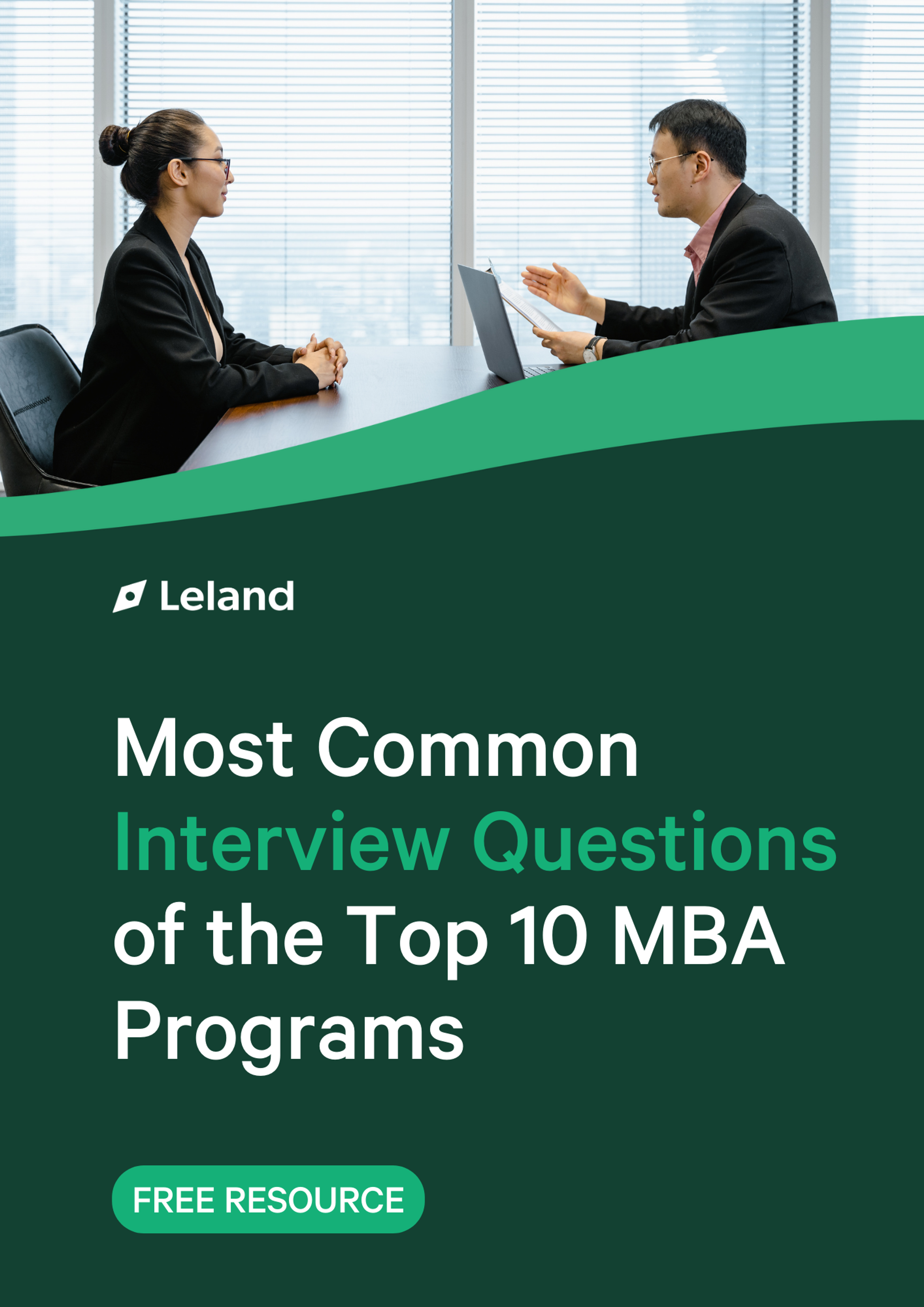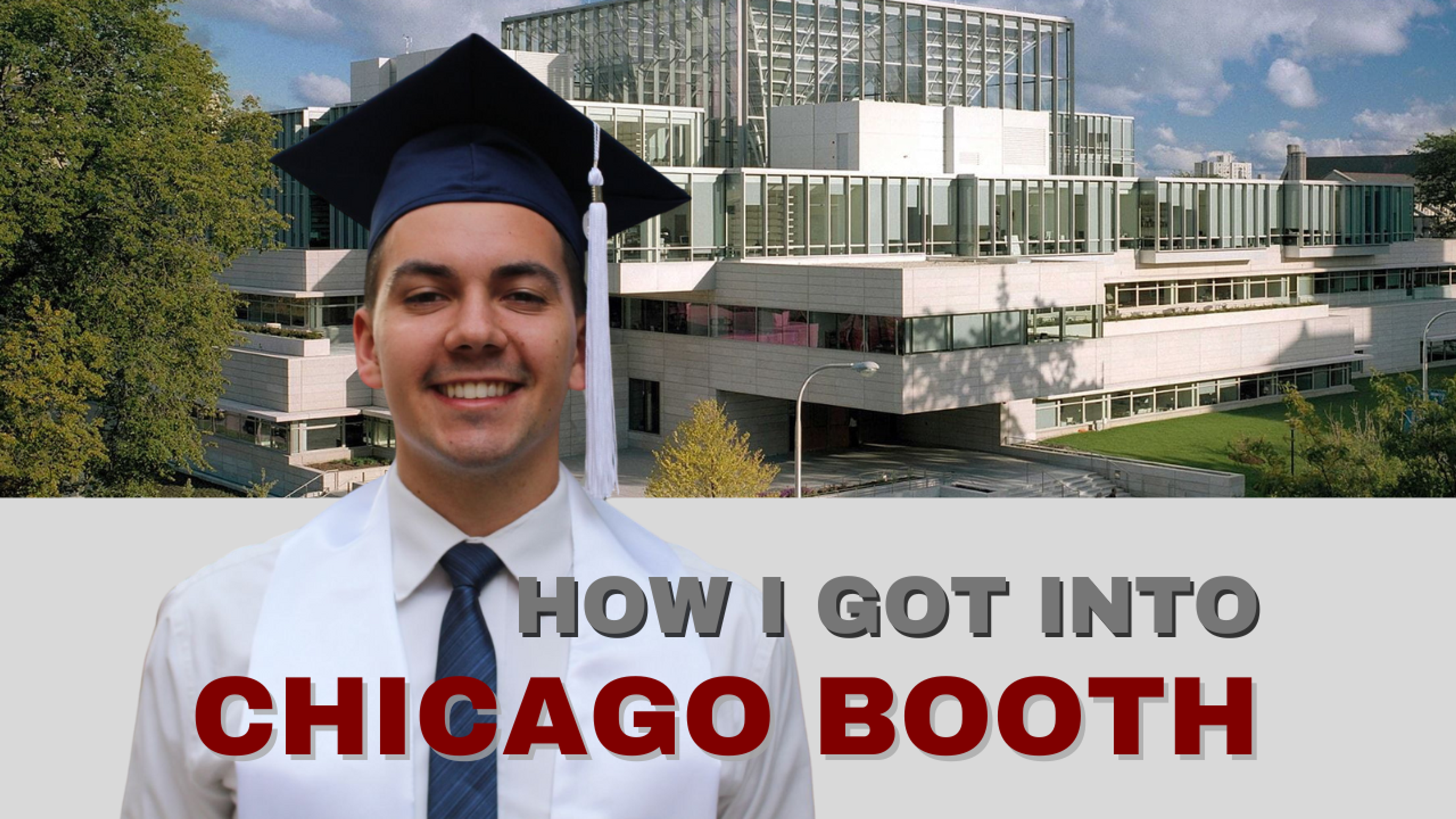
Table of Contents
Free Event

Featuring Horatiu S.
Profile Power: A LinkedIn Profile That Gets You In
Starting Tuesday, September 2
11:00 PM UTC · 45 minutes

Featuring Horatiu S.
Harvard Business School is one of the most competitive and sought-after MBA programs out there. If you’re lucky enough to land an interview, you’re in rarified air: only ~20% of applicants make it to where you are!
To help you ace the Harvard MBA interview, here are some tips, insights, and practice questions, compiled from our own in-depth research, and from our Leland coaches, many of whom have successfully navigated the HBS interview themselves. Leland is here to provide you with the expertise and opportunity you need to succeed as an MBA applicant and get into your dream school (and beyond!).
Before we start, some quick facts:
- HBS Interview Acceptance Rate: ~60%
- Interviewer: Trained MBA admissions staff member
- Length: 30 minutes
- Location: Virtual (when things are back to normal, you’ll be able to choose in-person)
- Context: Not blind (your interviewer will have read through your full application)
Types of Harvard MBA Interview Questions
The Harvard MBA interview is designed to assess MBA applicants’ qualifications, motivations, and fit for the program. Understanding the types of questions you’ll encounter can help you prepare more effectively. Generally, standard MBA interview questions can be categorized into three main areas: Past Experiences, Present Situation, and Future Goals. Let's explore each category.
Your Past Experiences
Some HBS interview questions will ask about your past. These are aimed at understanding your background, experiences, and the decisions you’ve made along the way. Likewise, these questions often address your academic and professional histories with the intent to uncover the rationale behind your choices and figure out how you’ll perform while in the MBA program. Questions can include:
- Educational Choices: “Why did you go to X college? Why did you decide to study X at that college?”
- Career Path: “Why did you choose to work at your current company?”
- Achievements: “What is your greatest accomplishment?”
- Challenges: “Give me an example of a time when you failed.”
Your Present Situation
Present-focused questions aim to understand your current situation, including your current job role, responsibilities, and the skills you bring to the table. These questions assess your self-awareness and your ability to analyze your current professional landscape.
These questions help give the committee an idea of how self-reflective you are. They’re more qualitative/behavioral questions to see what you’re like as a person. Some questions you may encounter are:
- Current Role: “What are your main responsibilities in your current job?”
- Professional Development: “How have you grown in your current role?”
- Industry Knowledge: “What trends are you seeing in your industry?”
- Adaptability: “Give me an example of when you successfully responded to change.”
Your Future Goals and Vision
Future-oriented questions are designed to gauge your aspirations, goals, and how you envision your career progressing after you earn your MBA. These questions generally help the admissions committee understand your motivations for pursuing an MBA and how the Harvard MBA program fits into your future plans.
- Career Goals: "What are your long-term goals?"
- Why Harvard: "Why are you applying to Harvard?"
- Post-MBA Vision: "How do you see the Harvard MBA helping you achieve your career goals?"
- Teaching Style: "What is your style for teaching peers?"
Follow-Up Questions
In addition to these main categories, make sure you’re ready to answer follow-up questions. These often are designed to connect the dots between your past, present, and future so the interviewer can see a more holistic view of your journey and aspirations.
These questions often serve multiple purposes, but they mostly help the interviewer see the coherence and logical flow of your story. They can also help the interviewer clarify any ambiguities in your initial responses, explore your thought process more thoroughly, and assess your ability to think on your feet. Here’s some examples of follow-up questions you may encounter:
- If you mention a specific project you worked on, an interviewer may ask, “Can you walk me through the challenges you faced during that project and how you overcame them?”
- If your initial answer is vague or unclear, you may be asked “Could you elaborate on what specific strategies you used to achieve that outcome?”
- Some questions are also designed to test how consistent your story is. They usually sound like something along the lines of “How does your current role prepare you for your long-term goals?”
By drawing connections between your past achievements, present circumstances, and future aspirations, you’ll be able to use these questions to your advantage by providing a comprehensive view of your career trajectory. That being said, it’s crucial to stay calm and composed when delivering your answers.
Understanding and preparing for these types of interview questions will help you present a well-rounded and confident image during your interview. Now, let’s move on to some specific tips to help you ace your Harvard Business School interview.
HBS Interview Tips
1. Be Yourself
This sounds obvious, but it’s probably the most important piece of advice you’ll hear. One of the top priorities of the MBA admissions board is to confirm that the person they’re speaking with is the same person whose application materials they’ve poured over, so make sure you’re not misrepresenting yourself. More importantly, though, the admissions committee wants to know who you are as a human being. If you’ve gotten to this stage of admissions, it’s a signal that Harvard Business School thinks you have the intelligence and acumen to thrive in their MBA program. The interview process is all about determining whether or not you’re a fit, character-wise, so be yourself and let your personality shine through!
2. Know Your Story, and Be Able to Explain It
All interviews will be conducted by a member of the admissions committee, who will have reviewed your resume and MBA application materials beforehand. They’ll want to know about the professional choices you’ve made, so make sure you know all your own facts and figures, but they’ll also want to know why you made these choices. If the HBS interviewer’s line of questioning could be boiled down to a single word, it would be that: Why? Come prepared to talk about your professional roles and the projects you worked on, and why you chose those roles and projects. Being able to explain your motivations clearly and confidently while answering interview questions will set you apart from other applicants.
3. Tell Them “Why HBS”
The next thing the admissions committee wants to know is how HBS fits into your career plan. They’re looking for candidates who have seriously envisioned themselves at HBS, understand the curriculum and experience of attending, and can concisely articulate why an MBA from Harvard will put them on the path to success. To nail this part, do your research ahead of time, so you can speak about Harvard’s classes, professors, and extracurriculars, and ensure that you can explain how those fit into your pre and post-MBA journey. (It’s helpful to set up a call with HBS alumni in advance of your interview, to get an even more in-depth view of the school.) Demonstrating a clear connection between your goals and what HBS offers is crucial to proving to HBS admissions officers that the Harvard MBA program is right for you.
4. Know Your Industry
To have a successful interview, you’ll need to come prepared to speak intelligently about your chosen path or industry, be it healthcare, tech, entrepreneurship, or anything else. Know your career vision front and back, and be able to explain ways in which the healthcare industry might change, what exciting new opportunities are popping up in the tech sector, and the challenges you might face as a startup founder. Show the AdCom that you have well-considered opinions and that you’re able to defend them.
5. Be Confident, Yet Humble
State your impressive accomplishments and stand up for your opinions, but of course, with a healthy dose of humility. Don’t exaggerate your experiences, be candid and direct, and you’ll do great. Say “thank you” after the interview, express gratitude for the opportunity to simply be there, and reiterate your interest in HBS. The AdCom wants to admit people who actually want to be there.
6. Prepare for Video
Set yourself up for success in your video interview. Make sure you’re in a clean, well-lit room with a strong internet connection. If you can place your desk in front of a plain, white wall, even better. Have any bullets or notes you’d like to refer to on-screen next to your Zoom app, in case you forget something. But always remember to maintain eye contact with your interviewer and keep things conversational, or you’ll come across as robotic and over-rehearsed.
For more tips, check out our full article on How to Nail Your Virtual MBA Interview.
7. Own the Post-Interview Reflection
After your MBA interview, you’ll be invited to share a post-interview reflection, a unique part of Harvard Business School’s application process. The reflection is due 24 hours after your interview and is designed to gauge how self-aware you are, and how well you respond on your feet. Don’t bring any prepared statements: that’s a big no-no. Instead, think about what you didn’t say in the interview that you wanted to touch on, what you might have done differently, and how you felt about the process. The best responses are authentic and sincere. Start off by thanking your interviewer, and offering a high-level reflection on how things went. Then touch on a few specific points of conversation, before sharing your overall reflection on the interview, and anything you learned during the process.
8. Practice with an expert
Make sure that you're ready to go on interview day by doing mock interviews beforehand with a Harvard MBA coach who can provide personalized feedback grounded in years of expertise. They know how to help you choose the right stories, frame your experiences in the most compelling way possible, and come across as genuine (and a great fit for the class!). For recommendations, check out: The Best Admissions Consultants for Your MBA Interview

Most Common Interview Questions of the Top 10 MBA Programs
Download our free guide to the most common MBA interview questions to be as prepared as possible to nail your interview
How to Answer the “Why Harvard?” Interview Question
We mentioned this question in passing earlier and want to emphasize just how important it is in your interview. This question is your ultimate opportunity to demonstrate both your knowledge of the program and why you believe you’re a perfect fit for it. Answering it correctly will show the HBS admissions board that you are genuinely interested in Harvard and how you will contribute to their community.
Because this question is so integral to the interview, we’ve put together some special tips to help you deliver a home-run answer that’ll be sure to impress your interviewer.
1. Highlight specific features of the program: If you’ve followed our advice from above, you’ll likely have done a lot of research into Harvard’s MBA program and the school’s overall offerings. During that process, you’ll likely find some specific elements that excite you such as a unique course, a professor who shares your academic interests, or a particular student organization. Mentioning these specifics in your answer will show that you’ve done your homework and have a genuine interest in what HBS has to offer.
These should also be unique to you. If your answer could be copied and pasted to someone else’s interview, it’s not specific enough. How will HBS help you and your goals?
2. Emphasize the community: Harvard Business School places a strong emphasis on their level of community and collaboration. Being able to reflect on how the values and culture of HBS align with your own personal and professional values in a specific way will solidify you as a good match for Harvard. However, it’s important to go beyond making general statements about shared values and whatnot. Instead, show how you will actively contribute to and enrich the HBS community through specific initiatives, clubs, or activities at the school.
3. Share a personal connection (if applicable): Do you have a friend, family member, or even a LinkedIn connection who you’ve spent some time talking with that goes to HBS? If so, make sure to mention how people in your life have influenced your perspective and desire to attend HBS. Moreover, show that your connections with these people will give you a leg up as a student at Harvard in one way or another (i.e. a current student may want you to join a club with them, or a recent alum may give you tips on how to maximize your time at HBS).
4. Show how you’ll grow: Consider sharing how the Harvard MBA program will not just advance your career but also contribute to your personal development. Talk about the leadership skills you aim to hone, the global perspectives you hope to gain, and the personal challenges you’re eager to tackle. This shows that you view the HBS experience as a holistic journey, not just a career stepping stone.
Example Answer
Here’s a sample response to the “Why Harvard?” questions that covers all of these bases:
HBS has been on my radar for a long time, particularly for its outstanding Academic Initiatives. Specifically, I’ve always been interested in Harvard’s Health Care Inititiative. The prospect of being able to work in tandem with faculty and other alumni would be the perfect environment for me to explore my career interests in the health care sector. Because of this, I envision myself also joining and becoming an active member in the Health Care Club in order to both learn from my older peers and, later in my program, help pay it forward to newer students. \
Besides the academic and social interests, however, I’ve also seen how an HBS education can shape a person into a force of power and positivity in the business world. I’ve mainly seen this through the example of my aunt, who attended HBS in 1998 in order to receive an MBA so that she might be eligible for a promotion in Procter & Gamble’s HR office. While her education was nothing short of amazing, she also tells me that Harvard’s community helped build her into the strong leader (and even mother) that she is today. In considering where to apply for my MBA program, her involvement in my life and the idea that I may be able to become a leader as capable as her helped put HBS at the top of my list.
Additional Sample HBS Interview Questions
Earlier, we introduced you to a few types of interview questions commonly asked in the Harvard MBA interview. Now, we’re expanding that list to provide you with even more questions pulled directly from actual HBS interviews. Read and think through the following questions so you know what to expect during your interview:
- Why did you decide to go to X college? Why did you decide to study X in that college?
- Why did you choose to work at your current company?
- What are your long-term goals?
- Give me an example of when you successfully responded to change.
- Why are you applying to Harvard?
- What is your greatest accomplishment?
- What is your style for teaching peers?
- Give me an example of a time when you failed.
- How would your closest friends describe you? Why?
- What do you think of the HBS admissions process?
Now you’re ready to tackle the Harvard MBA interview.
The HBS Post-Interview Reflection
The Harvard Business School interview is unique in that all interviewees are asked to submit a post-interview reflection after completing the interview. On its site, HBS states, “Within 24 hours of the interview, candidates are required to submit a written reflection through our online application system. Detailed instructions will be provided to those applicants who are invited to interview.” For advice from an HBS admit, head here: How to Write a Powerful HBS Post-Interview Reflection.
Our Top Tip for HBS Interview Prep
The HBS interview process is notoriously difficult and intense. HBS interviewers are known for harping on very specific portions of the application. They want to know that you made decisions intentionally, have a clear upward trajectory, and know your story. Expect a lot of “why” questions – why did you go to that company? Why did you make that decision? Why did you approach the solution that way? From past HBS interviews, we know that asking three to four (or more) follow-up questions to one specific line of your resume is normal – make sure that you can defend every word of it as well as the narrative you’ve weaved throughout the rest of your application. We also recommend having a deposit of anecdotes to pull from that you can use for different situations. While the best thing you can do for your HBS interview prep is to do a mock interview with an expert, the second best is preparing your story as deeply as possible.
Ace Your HBS Interview With the Help of an Expert
One last note: everything we’ve shared here will give you a great start, but nothing can replace old-fashioned practice—and practicing with someone who’s been through the process is the best thing you can do to set yourself up for success. We have dozens of coaches on Leland with HBS experience, and they’re ready to help you prepare.
Below are some of our top HBS interview coaches who can conduct mock interviews, help you craft the right answers, and provide personalized guidance. Browse all of our world-class MBA admissions coaches here.
Here are several other articles you may find interesting:











